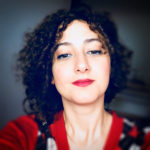(“Gaza: A Gaping Wound”, 2015, Poland/Palestine, Anne Peq)
What inspired you to make this film?
During the 2014 Israeli assault on the Gaza Strip, 142 Palestinian families lost three or more members. While covering the events, photographer Anne Paq and reporter Ala Qandil saw families entirely wiped out. Later on, different numbers were used to describe the extent of the attacks. But statistics cannot reflect the loss of a loved one, the bombing of a home, the fear or the trauma that comes after the ceasefire. This film tells stories of those mothers, sons and daughters who died that summer and of those who have survived.
What do you want American audiences to know about this film or about the subject matter?
In the summer of 2014, the Israeli military launched the assault codenamed “Protective Edge” on the Gaza Strip. This was the most brutal Israeli aggression since 1967. For 51 days, trapped and targeted by Israeli fire from air, land, and sea, with nowhere to go and nowhere to hide, as even hospitals and UN shelters were no safe place, Palestinians living in the Gaza Strip have suffered inconceivable loss. Today, the survivors are still trapped – under the siege and occupation, forced to live alongside the rubbles of the houses where their families were bombed, as the reconstruction of Gaza, hindered by Israeli restrictions, is taking place at an extremely slow pace.
Is it difficult to make films in your home country? Why or why not?
The access to the besieged Gaza Strip is limited, only humanitarian workers, diplomats and journalists with special Israeli-issued permission are allowed to enter.
Is there anything else you want us to know about you as a director or about your film?
The film is a part of the “Obliterated Families” project, a multimedia website, which through different means: text, photos, videos, design, infographics tells stories of ten families who lost many members in 2014. The project grew even bigger over the last half year, as we expanded it to include exhibitions, books, postcards and posters. Please visit our website www.obliteratedfamilies.com to learn more.
“February 2017”
Disclaimer: Please note that most artists, filmmakers and authors presented by FCI are not native speakers of the English language. To avoid misinterpretation, it is FCI’s policy to print their responses as received without structural or content changes.

